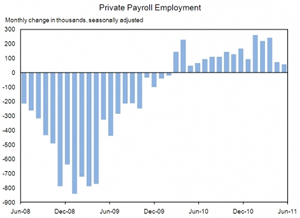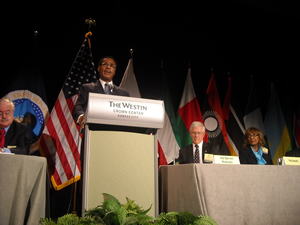| |  | | | |
THE EMPLOYMENT SITUATION IN JUNE
For the second straight month, we have seen an increase in overall unemployment by .1%. Unemployment in the African American community has stayed the same – a painful 16.2%. Millions are still out of work and families are still struggling to make ends meet.
From the White House Council of Economic Advisers:

Today's employment report shows that private sector payrolls increased by 57,000 in June and the unemployment rate ticked up to 9.2 percent. While the private sector has added 2.2 million jobs over the past 16 months, this month's report reflects the recent slowdown of economic growth due to headwinds faced in the first half of this year.
The unemployment rate remains unacceptably high and faster growth is needed to replace the jobs lost in the downturn. Today's report underscores the need for bipartisan action to help the private sector and the economy grow – such as measures to extend the payroll tax cut, pass the pending free trade agreements, and create an infrastructure bank to help put Americans back to work. It also underscores the need for a balanced approach to deficit reduction that instills confidence and allows us to live within our means without shortchanging future growth.
Overall payroll employment rose by just 18,000 in June. Sectors with employment increases included leisure and hospitality (+34,000), health care (+13,500), and manufacturing (+6,000). Sectors with employment declines included government (-39,000), financial activities (-15,000), and construction (-9,000). Manufacturing has added 251,000 jobs since the beginning of 2010, the best period of manufacturing job growth in over a decade. Meanwhile, local governments lost 18,000 jobs in June and have shed 355,000 jobs since the start of 2010.
The monthly employment and unemployment numbers are volatile and employment estimates are subject to substantial revision. Therefore, as the Administration always stresses, it is important not to read too much into any one monthly report.
It is clear to me that we are in the midst of a jobs crisis—not a debt crisis. After six months of controlling the House, the Republican Leadership continues to prevent critical jobs legislation from being considered and passed. Instead, they have cut funding to critical programs that directly serve our country's most vulnerable communities, costing hundreds of thousands of jobs and further weakening our economy. Now, as the debt ceiling debate continues, the Republican Leadership is still attempting to cut funding to vital programs such as Medicaid, Medicare and Social Security. I remain fearful that reckless spending cuts will severely undermine and prevent recovery for every American community. I remain committed to responsibly reducing the deficit and raising the debt ceiling, while safeguarding the progress that we have made in the job market by investing in our future. Investing in our communities goes hand in hand with full economic recovery. No investment, no recovery.
A DANGEROUS DEBATE
As I have shared with you in the past issues of EC from DC, I do not support cuts in benefits for Social Security and Medicare. Social Security did not cause our deficit, and we should not consider it a piggy bank for giving tax cuts to the wealthiest people in the country.
But enough from me. A new Pew poll released yesterday shows that I am not alone in this view. By a 28-point margin, more Americans say it is more important to keep Social Security and Medicare benefits as they are than take steps to reduce the budget deficit (60 percent to 32 percent) – including more independents by a 15-point margin (53 percent to 38 percent).
88 percent of those surveyed say Medicare has been very good or good for the country – including 93 percent of Democrats, 86 percent of Independents and 85 percent of Republicans.
Social Security is not a partisan issue. The majority of all Americans, from the far left to far right, oppose cutting Social Security benefits. Social Security is an American program, and promotes the values we all hold dear-- rewarding hard work, honoring our parents and caring for our neighbors. For these reasons, I have just signed onto a resolution expressing the sense of Congress that Social Security benefits should not be reduced.
According to White House Office of Management and Budget Director Jacob Lew, a man far smarter than I on these matters:
Specifically, looking to the next two decades, Social Security does not cause our deficits. Social Security benefits are entirely self-financing. They are paid for with payroll taxes collected from workers and their employers throughout their careers. These taxes are placed in a trust fund dedicated to paying benefits owed to current and future beneficiaries … The problem is not Social Security; the problem is the mismatch between outlays and revenues in the rest of the budget. Closing that gap and paying down our debt will take tough choices, and the president's budget makes them…
We must not balance our budget on the backs of seniors, the middle class, and the least of these. We must remove all doubt in anyone's mind that we will not default on past debt. If we default on our debt, it will not prove some sort of point to the politicos or the people—it will cause catastrophe. Stock prices will fall, taking a direct hit on families' 401(k)s, pensions, and savings. Housing prices will drop and home sales will plummet. Social Security checks could be withheld and massive numbers of federal workers could be furloughed. Lower-income families would foot the bill, as interest rates rise and their debt payments increase. It's time for both parties to work together to ensure we pay America's bills and enact a balanced deal to reduce the deficit that includes both revenues and spending cuts so that we can give the markets certainty and avoid disarray.
THE INTERNATIONAL FOOD AID AND DEVELOPMENT CONFERENCE

Photo by Abdul Bakar
Last Monday I had the honor of speaking at the 2011 International Food Aid and Development Conference here in Kansas City, sponsored by the U.S. Department of Agriculture and USAID. Now in its thirteenth year, this conference has become the largest food aid and agricultural development conference in the U.S. Last year had more than 550 participants from over 20 nations, with representatives from the food and agricultural industries, maritime and rail transportation, ports, non-governmental organizations, and governments. Topics covered this year included: food security, nutrition, logistics, sustainable agricultural development, public-private partnerships.
I appreciated the opportunity to address this diverse group and share the effects that proposed budget cuts will have on the nutrition of Americans most in need and sever the support given to millions of poor people around the world who depend on the U.S. for donations of food and agricultural expertise that help them grow more of their own food. The Agriculture Appropriations bill (H.R. 2112) recently passed by the House of Representatives cuts funding for the USDA by 15 percent and the Supplemental Nutrition Assistance Program (SNAP) by $2 billion. The Women, Infants and Children Program (WIC) would receive $1.3 billion less than requested by the President, which will deny food and health counseling for up to 350,000 low-income women and young children for next year. In Missouri, between 3,300 and 5,800 applicants - struggling mothers, their children, and infants in need – will go hungry.
Tightening our belts is something we need to do. But austerity is not the answer. People who depend upon supplemental food programs – such as WIC or SNAP or school nutrition programs – have belts that are already cinched as tight as they can go. The U.S. is the greatest agricultural producer in the world. But the cuts in this bill undermine the very resources that support our agricultural supremacy. Cuts must be made to help reduce the deficit, but they must be targeted – with a scalpel instead of a machete – so that we do not collapse the economy we are trying to build up.
A NEW MARSHAL IN TOWN
I am proud to announce that the Senate has confirmed Chief Alfred C. Lomax of Kansas City to be the next U.S. Marshal for the Western District of Missouri. I gave Chief Lomax a call last night, and it gives me great satisfaction to share the news with you today.
Chief Lomax and I have known each other since I was Mayor of Kansas City. Chief Lomax joined the Kansas City Police Department in 1963, and later served as the Deputy Chief of the Investigation Bureau of the Kansas City Police Department, a position from which he retired in 1992. He then became the head of Airport Police at Kansas City International Airport. Chief Lomax will be sworn in as U.S. Marshal on Wednesday, July 13, 2011, in Washington, D.C.
Several months ago, I recommended him to President Obama. The President included Chief Lomax in his nominations on March 2, 2011, saying "I am pleased to nominate these outstanding public servants to serve as U.S. Marshals. Throughout their careers, these individuals have demonstrated an unwavering commitment to justice, and I am grateful for their continued willingness to serve and protect the American people."
The U.S. Marshals Service is the nation's oldest and most versatile federal law enforcement agency. Federal Marshals have served the country since 1789. To this day, the Marshals Service occupies a uniquely central position in the federal justice system. It is the enforcement arm of the federal courts, and as such, it is involved in virtually every federal law enforcement initiative.
Presidentially appointed, U.S. Marshals direct the activities of 94 districts — one for each federal judicial district including Missouri's Western District. More than 3,953 Deputy U.S. Marshals and criminal investigators form the backbone of the agency. Among their many duties, they apprehend federal fugitives, protect the federal judiciary, operate the Witness Security Program, transport federal prisoners and seize property acquired by criminals through illegal activities.
I know Al will bring to the U.S. Marshal's office the same integrity and professionalism that has become his trademark over his thirty years of public service. It was my honor to recommend him to the President, and I am pleased to see that my colleagues in the Senate agreed.
For further information about U.S. Marshals, click here.
Follow me on Twitter!
You can now follow me @repcleaver. As always, I look forward to hearing from you.
Click here to add me >>> https://twitter.com/repcleaver

Emanuel Cleaver, II
Member of Congress
| |
|
|  |
| Kansas City Office
101 W 31st St.
Kansas City, MO 64108
Phone: 816-842-4545
Fax: 816-471-5215 | Independence Office
211 West Maple Avenue
Independence, MO 64050
Phone: 816-833-4545
Fax: 816-833-2991 | Washington Office
1433 Longworth HOB
Washington, D.C. 20515
Phone: 202-225-4535
Fax: 202-225-4403
|
|
|
| |
| | |
|